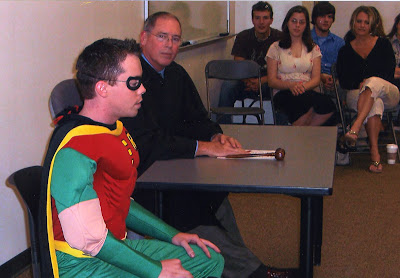Like a few people state: He's a forensic scientist. And it's true! Forensic scientists are multidisciplinary just like Batman. And really anybody who applies the techniques and methods of science to solving crimes is a forensic scientist.
 Here at Building Batman, I'm introducing myself to everything that someone would need to know to be Batman. And so, on with forensics. Because as everybody (who's read the last paragraph) knows Batman is the world's greatest forensic scientist!
Here at Building Batman, I'm introducing myself to everything that someone would need to know to be Batman. And so, on with forensics. Because as everybody (who's read the last paragraph) knows Batman is the world's greatest forensic scientist!The book I picked up is generically titled 'Forensic Science' and it's written by Jay Siegel who is the “Chair of the Department of Chemistry and Biology, and Director of the Forensics and Investigative Sciences Program, at Indiana University-Purdue University”. I read “ Chemistry and Biology” as a single department and “Forensics and Investigative Sciences Program” as a supplement to a diploma of some kind. Otherwise, this guy must not sleep.
In any case, he seems to have recognized the public interest in forensics due to fiction like the CSI franchise. As such, he doesn't really explain anything in the book but rather just introduces concepts and basic ideas. His intent is only to inform the general public on the topics and limitations of forensic science. He discusses the “CSI-Effect”, the exaggeration of forensic science's ability to magically and quickly collect and analyze all the evidence needed to convict bad guys. Furthermore, the CSI-Effect means that juries expect prosecutors to present incriminating forensic evidence. They tend to discount evidence that doesn't have the Authority of Science (notice the capital letters, please) backing it up.
 But not only does forensic science have limitations but so do forensic scientists. Observer Bias (<---that's a great link) can creep in and corrupt the scientific method. Extra information (that may not even be true) can (and presumably does) influence the way that a forensic scientist interprets their results causing the scientist to get in the way of the science. Perhaps, forensic scientists should only be given the evidence and asked to apply scientific techniques to discover what they can. But if you think about that, it's not a very practical way of doing business. How should they know what to search for? or what tests should they apply? Perhaps the some piece of withheld information could be the key in solving a crime. Who decides what is “domain irrelevant”? It's a big question. Even wording in reports can cause subtle bias. There are other kinds of bias. There is Conformational Bias, where the results of one forensic scientist influence another's toward agreement. Or even a pro-prosecutor bias. The author certainly seems to think that regulatory bodies are lacking and that certification and supervision are needed.
But not only does forensic science have limitations but so do forensic scientists. Observer Bias (<---that's a great link) can creep in and corrupt the scientific method. Extra information (that may not even be true) can (and presumably does) influence the way that a forensic scientist interprets their results causing the scientist to get in the way of the science. Perhaps, forensic scientists should only be given the evidence and asked to apply scientific techniques to discover what they can. But if you think about that, it's not a very practical way of doing business. How should they know what to search for? or what tests should they apply? Perhaps the some piece of withheld information could be the key in solving a crime. Who decides what is “domain irrelevant”? It's a big question. Even wording in reports can cause subtle bias. There are other kinds of bias. There is Conformational Bias, where the results of one forensic scientist influence another's toward agreement. Or even a pro-prosecutor bias. The author certainly seems to think that regulatory bodies are lacking and that certification and supervision are needed.And bias is definitely not the only human error that can hinder forensic science. Somehow, the evidence has to get from the scene of the crime to the lab. Only rarely do forensic investigators accompany detectives and police investigators to crime scenes. All evidence must be searched out and collected without damage, which can be tough if say the evidence is a single fiber or buried under the debris from and explosion or liquid blood that will putrefy. The author makes a very tight analogy. Crime scene investigations are immediate archaeological digs. Investigators sift through the evidence and clues to reconstruct a past event.
Forensic also should be limited by the courts. Not all evidence is relevant or competent and so not all evidence should be allowed to be admitted.
- Evidence must be material meaning it must have something to do with the case at hand.
- Evidence must be probative meaning it must prove something and not just be a fact.
- Evidence must competent meaning that it must abide by a set of rules – a spouse may not have to testify against their partner or a religious confession might not meet competence constraints.
 Forensic scientists have expert witness status when they testify which simply means that they have knowledge or skills to draw conclusions from a set of facts that your average juror could not. This means that not only must they be good scientists but they must also be good teachers. Despite all this, we should remember that just because a scientist has arrived at some conclusion does not mean that it is de facto truth. People tend to believe scientists and so if they testify in a court case jurors may accept their words without question.
Forensic scientists have expert witness status when they testify which simply means that they have knowledge or skills to draw conclusions from a set of facts that your average juror could not. This means that not only must they be good scientists but they must also be good teachers. Despite all this, we should remember that just because a scientist has arrived at some conclusion does not mean that it is de facto truth. People tend to believe scientists and so if they testify in a court case jurors may accept their words without question.That's the background information. Over the next couple of days, I will summarize the material covered in “Forensic Science” by Jay Siegel. We'll talk about
Pattern Evidence
Evaluating PMI
Serology
DNA
Drugs
Fires and Explosions
Trace Evidence






































1 comment:
Good stuff!
I love the Simpsons joke, in the monorail episode:
"Homer, someone's here to help you!"
"Is it Batman?!?"
"No, he's a scientist!"
"Batman's a scientist!"
I got to learn a lot of cool stuff when I took a Criminology class, but I'm looking forward to learning more about forensics.
Post a Comment